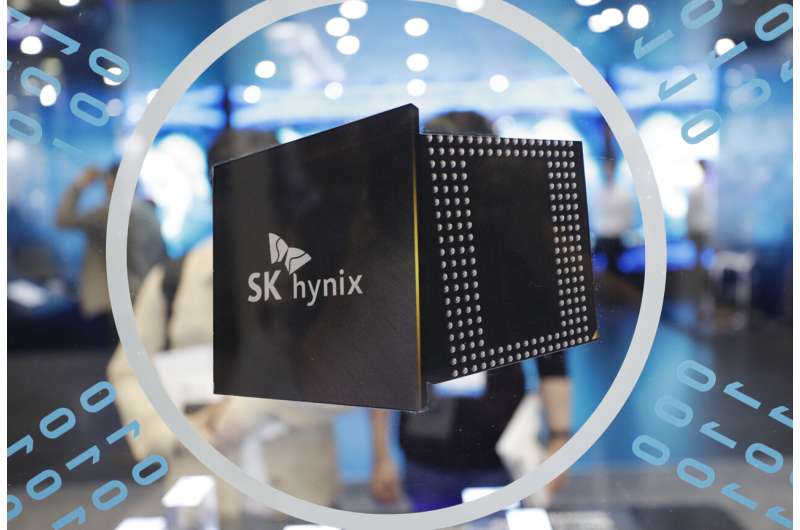South Korean chipmaker SK Hynix worries about China future

South Korean computer chipmaker SK Hynix said Wednesday it might be forced to sell its manufacturing operations in China if a U.S. crackdown on exports of semiconductor technology and manufacturing equipment to China intensifies.
SK Hynix's chief marketing officer, Kevin Noh, raised those concerns during a conference call on Wednesday after the company reported its operating profit dropped 60% in the last quarter from 2021, a decline it blamed on a deteriorating business environment.
Global inflation amplified by Russia's war on Ukraine and rising interest rates imposed by central banks to counter surging prices have slowed consumer spending on the kinds of high-tech products requiring computer chips. SK Hynix and other semiconductor makers are also navigating new U.S. restrictions on exports of advanced semiconductors and chipmaking equipment to China. Such limits were in part imposed to prevent use of American advanced technology in China's military development.
SK Hynix said this month that the U.S. Department of Commerce granted the company a one-year exemption from such requirements, allowing it to provide equipment and other supplies to its Chinese factories making memory chips.
Other major chip and chip-manufacturing equipment makers like Samsung and Taiwan's TSMC are thought to have also gotten exemptions.
SK Hynix may find it difficult to equip its manufacturing line in the eastern Chinese city of Wuxi with the most advanced chipmaking machines, including extreme ultraviolent lithography (EUV) systems, Noh said. He said SK Hynix doesn't expect major disruptions at the plant at least until the late 2020s, but things could quickly turn for the worse if Washington refuses to extend temporary exemptions at some point and begins to fully enforce its export controls.
"If it becomes a situation where we would have to obtain (U.S.) license on a tool-by-tool basis, that will disrupt the supply of equipment … and we could face difficulties in operating (Chinese) fabrication facilities at a much earlier point than the late 2020s," Noh said.

"If we face problems that make it difficult for us to operate our Chinese fabrication facilities including the Wuxi plant, we are considering various scenarios, including selling those fabrication facilities or their equipment or bringing them to South Korea," Noh said.
He said those contingency plans would apply to a "very extreme situation," and the company hopes to avoid such problems and operate as normal.
Citing an "unprecedented deterioration" in market conditions, SK Hynix said it would cut its investment next year by more than 50% as it anticipates supply will continue to exceed demand for the time being. The country's operating profit for the three months through September was at 1.65 trillion won ($1.16 billion), compared to 4.17 trillion won ($2.92 billion) during the same period last year. Revenue fell 7% to 10.98 trillion won ($7.7 billion).
Some experts say that the U.S.-China technology standoff could force SK Hynix and Samsung Electronics, another major South Korean chipmaker, to significantly modify their Chinese operations over the next few years.
According to market analysis firm TrendForce, SK Hynix's Wuxi plant accounts for about 13% of the world's total DRAM production capacity. About 40% of Samsung's NAND flash chips are reportedly produced from its factory in the Chinese city of Xi'an, accounting for around 10% of global production.
"The existing (principles) we accepted as common sense, such as finding a certain region where we could produce most efficiently at the cheapest cost and shipping those products globally, are becoming increasingly uncertain as (our) decision making is being influenced by various layers of factors beyond just business," Noh said.
Samsung, the world's largest provider of memory chips, is widely believed to have received a similar exemption from the U.S. restrictions, although the company has not publicly confirmed it. Noh during the call said SK Hynix's "competitors" have also been granted the U.S. waivers, in a possible reference to Samsung and Taiwan's TSMC.
© 2022 The Associated Press. All rights reserved. This material may not be published, broadcast, rewritten or redistributed without permission.


















